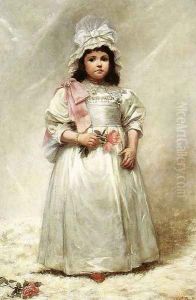Elizabeth Lyman Boott Duveneck Paintings
Elizabeth Lyman Boott Duveneck, born on August 13, 1846, in Boston, Massachusetts, was an American artist best known for her work in painting, her patronage of the arts, and her role in the late 19th-century art scene both in the United States and Europe. She was the daughter of Francis Boott, a successful businessman and composer, and was raised in a cultured environment, which helped foster her love of the arts from a young age.
Elizabeth, often referred to as Lizzie, showed a strong inclination towards the arts early in life. She received her initial education in the United States before moving to Europe, where she lived for most of her adult life. Italy, and particularly Florence, became her home, and she became deeply involved in the expatriate art community there. She received training in painting and excelled in creating works that were influenced by the aesthetics of the time, including the prevailing styles of American and European art.
Lizzie Boott was an active participant in the intellectual circles of Florence, where she met Frank Duveneck, an American painter who was well respected for his vigorous style and teaching. The two formed a close relationship that eventually led to their marriage in March 1886. Frank Duveneck's influence is evident in Elizabeth's work, which often mirrored the dark tonalities and realist tendencies of his paintings. Her works included landscapes, portraits, and genre scenes, which were well-received by her contemporaries and are considered to have contributed to the spread of American artistic ideals in Europe.
Despite her talent and growing reputation as an artist, Elizabeth Boott Duveneck's career was cut short by her untimely death. She died on March 22, 1888, in Paris, France, at the age of 41, after suffering from pneumonia. Her death deeply affected her husband, who created a memorial for her in the form of a sculpted effigy placed at her grave in the Cimitero Evangelico degli Allori in Florence.
Elizabeth Lyman Boott Duveneck's artistic legacy is preserved through her artworks and the influence she had on the American art community in Italy. Her contributions to the arts continue to be recognized, and her life is a testament to the role of women artists in the 19th century, often overshadowed by their male counterparts. She remains a notable figure in the study of American expatriate artists in Italy during her era.
